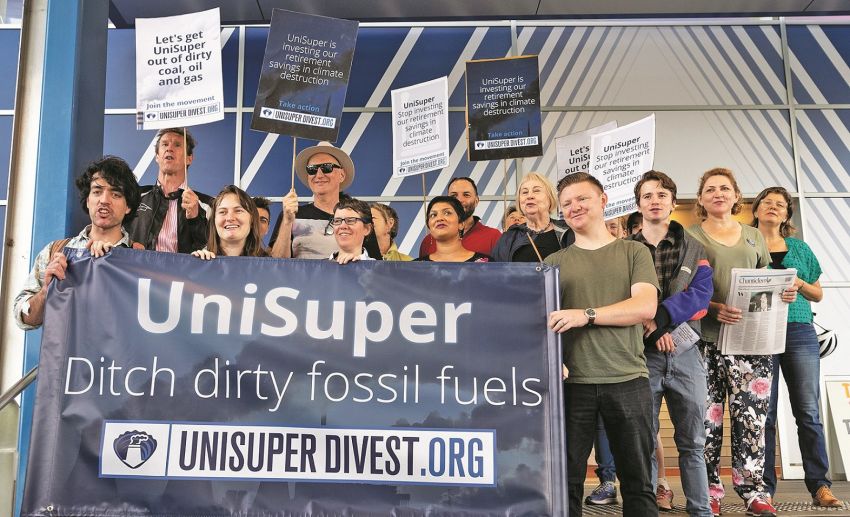
The superannuation system is under increasing scrutiny from climate activists as much of its funds are invested in climate-damaging companies.
Collectively, Australians hold $3 trillion in superannuation retirement savings that, in turn, hold 40% of shares on the Australian stock market.
In one case, Mark McVeigh is suing his super fund REST Super for failing to act in his best financial interest and not providing enough information about how it is managing climate risks. The trial, set for July, could have implications for the global pension fund sector.
Divestment campaigns are also being ramped up. In January, Market Forces, an affiliate of Friends of the Earth Australia, launched UniSuper DIVEST targeting the industry fund for academics, scientists and other university employees.
Market Forces has identified 21 Australian corporations it says are “out of line” because they are undermining the Paris Agreement’s climate goal to stay under 1.5°C. The list includes Whitehaven Coal, New Hope, Santos, Woodside and Oil Search.
Market Forces states “the majority of Australia’s super funds have used their members’ savings to block climate action”.
UniSuper is a laggard on climate change. It has $7.8 billion invested in coal, oil and gas companies. It has also failed to vote for a single climate change-related shareholder resolution.
In just 6 weeks, Market Forces collected more than 10,000 signatures for its open letter calling on UniSuper to divest from companies helping to expand the fossil fuel sector or whose business prospects rely on scenarios that are incompatible with the Paris Agreement.
The National Tertiary Education Union (NTEU) decided in October to declare a climate emergency and will launch its own divestment campaign in March.
Both organisations have agreed to support each others’ efforts.
But should such campaigns limit their attention to fossil-fuel extraction while ignoring industries heavily reliant on fossil-fuel consumption?
Logically, there can be no consumption of fossil fuels if extraction is stopped, as must happen to avoid dangerous warming.
There should be space to consider which industries waste the most fossil fuels and could be decarbonised.
Arguably, that industry is transport, Australia’s third largest source of greenhouse emissions. Transport has a high carbon footprint because of its reliance on private motor vehicles and road freight.
This is where UniSuper could play a significant role. UniSuper is the single largest shareholder of toll road operator Transurban, owning 14%. The Commonwealth Bank of Australia is the second largest shareholder, owning 5%.
Transurban has a near-monopoly on Australia’s toll roads and owns 51% of the southern hemisphere’s largest urban motorway project, the partially-completed WestConnex in Sydney.
UniSuper has been under pressure to divest from Transurban from the long-running resident-run campaign against WestConnex. NSW Greens MLA Jenny Leong has been hosting a site since 2017 calling for super funds to divest from motorways.
UniSuper still includes Transurban in its “Sustainable Investment” option. Market Forces has not included Transurban in its UniSuper DIVEST campaign, but there is a possibility the NTEU will.
In 2018, the NTEU NSW division asked the union's National Executive to direct the union’s nominee on the UniSuper board of directors (currently Grahame McCulloch) to support divestment from Transurban.
Transurban is highly leveraged on future toll revenue and road expansion. If the campaign is successful and investors start pulling out, a shift to sustainable and efficient public transport could play a big part in reducing greenhouse gas emissions.
[Andrew Chuter is an NTEU NSW Division Councillor and a No WestConnex: Public Transport activist.]